![]()
Here is a Mars view captured from
Paris surroundings (Boulogne) on 07/13/2003 at the focus of an 8"
MEADE LX200 telescope equipped with a lengthened 3x Barlow lens (F/D=36).
Camera model is a Philips Vesta Pro.This view is a combination of
350 raw pictures processed through a wavelet filter with IRIS software.
Mars was at a distance of 82 millions kilometers from earth.
Notice the huge southern icy polar cap.
The movie is composed of 24 views captured 5 minutes apart. Mars and earth rotation periods are similar. Mars rotation period is exactly 24.6 hours.
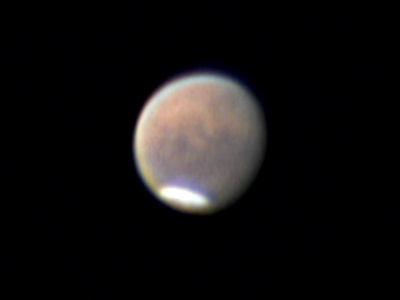 |
 Mars
movie (400x300 .GIF format 2831K) Mars
movie (400x300 .GIF format 2831K) |
Here is a Mars view captured from
Paris surroundings (Boulogne) on 08/01/2003 at the focus of an 8"
MEADE LX200 telescope equipped with a lengthened 3x Barlow lens (F/D=36)
and a 23A red filter. Camera model is a Philips Vesta Pro.This
view is a combination of 1400 raw pictures processed through a
wavelet filter with IRIS software.
Mars was at a distance of 63 millions kilometers from earth.
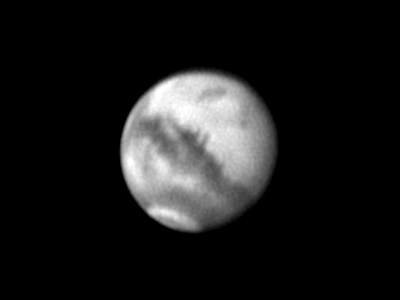 |
Here is a Mars view captured from
Paris french pyrenean mountains on 08/12/2003 at the focus of an
8" MEADE LX200 telescope equipped with a lengthened 3x Barlow lens (F/D=36) and a dark red filter (WRATTEN 70). Camera model is
a Philips Vesta Pro.This view is a combination of 1200 raw
pictures processed through a wavelet filter with IRIS software.
Mars was at a distance of 57 millions kilometers from earth.
Notice the eye shaped pattern surrounding the region of Solis
Lacus.
The clear spot on top of Mars is Olympus Mons volcano.
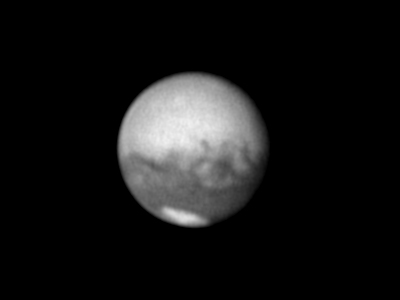 |
The two views below were captured
from Sierra Nevada in South of Spain, respectively on 08/18/2003
(left picture) and on 08/26/2003 (right picture). Both views were
captured at the focus of an 8" MEADE LX200 telescope equipped
with a lengthened 3x Barlow lens (F/D=36) and a dark red filter (Wratten
70). Camera model is a Philips Vesta Pro.
Each view is a combination of 500 raw pictures processed through
a wavelet filter with IRIS software.
Mars was at a distance of 57 millions kilometers from earth.
Each movie is composed of 7 views captured 10 minutes apart.
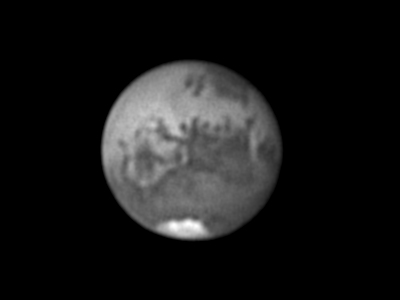 |
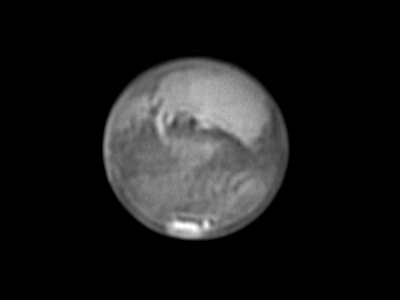 |
 Mars
movie (640x480 ,GIF format 171K) Mars
movie (640x480 ,GIF format 171K) |
 Mars
movie (640x480 ,GIF format 178K) Mars
movie (640x480 ,GIF format 178K) |
This 3D view is an anaglyph
composed of two pictures from the upper left movie (30 minutes
elapsed between both frames).
Try with your 3D glasses and enjoy ....
Here is another view of Mars
captured in similar conditions as both previous ones on 08/27/2003.
Turbulence level was less suitable. This view is an addition of
500 pictures.
Mars was at a distance of 56 millions kilometers from earth, the
shortest opposition distance. The dark region on top right is
Syrtis Major. On the bottom right the circular basin is Hellas
plain.
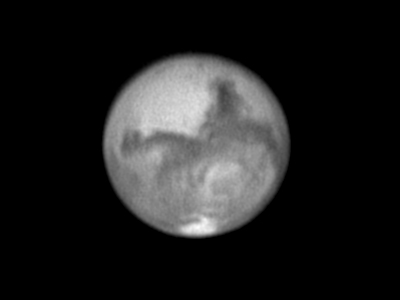 |
Here is a Mars view captured from
Paris surroundings (Boulogne) on 09/24/2003 at the focus of an 8"
MEADE LX200 telescope equipped with a lengthened 3x Barlow lens (F/D=36)
and a dark red filter (WRATTEN 70). Camera model is a Philips
Vesta Pro.This view is a combination of 500 raw pictures
processed through a wavelet filter with IRIS software.
Mars was at a distance of 64 millions kilometers from earth.
The joined movie represents 2H20 of rotation on the basis of one
frame every 10 minutes. Each frame is a combination of 500 raw
pictures processed through IRIS software.
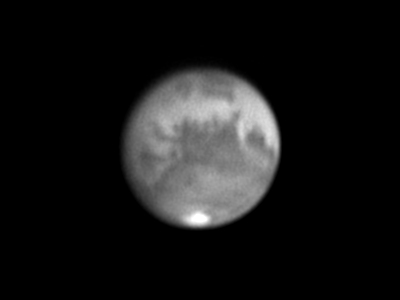 |
 Mars
movie (640x480 .GIF format 313K) Mars
movie (640x480 .GIF format 313K) |
Here is a Mars view captured from
Paris surroundings (Boulogne) on 11/06/2003 at the focus of an 8"
MEADE LX200 telescope equipped with a lengthened 3x Barlow lens (F/D=36)
and a 23A red filter. Camera model is a Philips Vesta Pro.This
view is a combination of 500 raw pictures processed through a
wavelet filter with IRIS software.
Mars was at a distance of 100 millions kilometers from earth.
Notice the drastically reduced diameter, the decreasing phase and
the dot shaped icy polar cap.
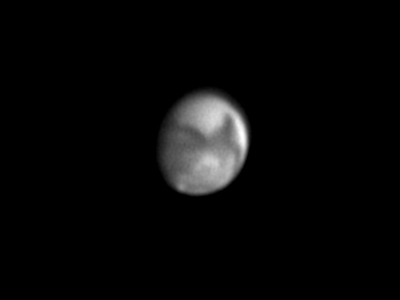 |
These three pictures of Mars were captured a little more than a month apart with an 8" MEADE LX200 telescope. All pictures have been set at the same scale in order to compensate the size change of the planet. Juxtaposition of these 3 pictures makes clearly visble the recession of the south icy polar cap exposed to sun rays.
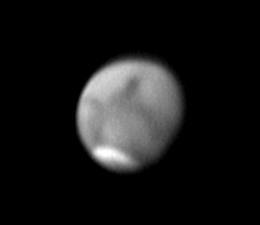 |
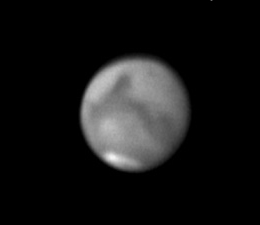 |
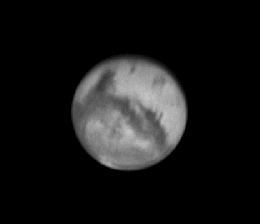 |
| 06/22/2003 | 07/29/2003 | 09/02/2003 |